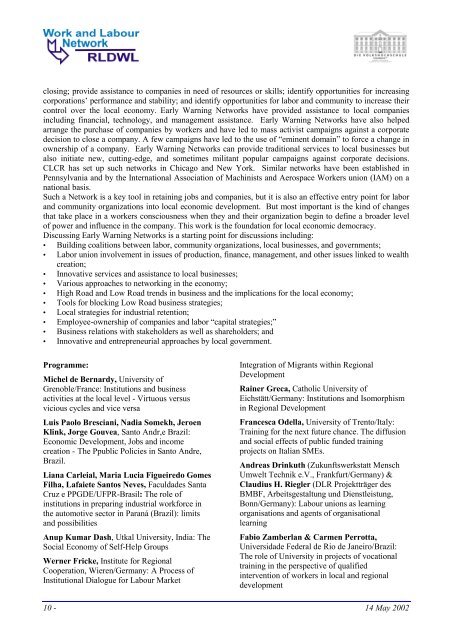"Labour, Globalisation and The New Economy" - rldwl
"Labour, Globalisation and The New Economy" - rldwl
"Labour, Globalisation and The New Economy" - rldwl
You also want an ePaper? Increase the reach of your titles
YUMPU automatically turns print PDFs into web optimized ePapers that Google loves.
closing; provide assistance to companies in need of resources or skills; identify opportunities for increasing<br />
corporations’ performance <strong>and</strong> stability; <strong>and</strong> identify opportunities for labor <strong>and</strong> community to increase their<br />
control over the local economy. Early Warning Networks have provided assistance to local companies<br />
including financial, technology, <strong>and</strong> management assistance. Early Warning Networks have also helped<br />
arrange the purchase of companies by workers <strong>and</strong> have led to mass activist campaigns against a corporate<br />
decision to close a company. A few campaigns have led to the use of “eminent domain” to force a change in<br />
ownership of a company. Early Warning Networks can provide traditional services to local businesses but<br />
also initiate new, cutting-edge, <strong>and</strong> sometimes militant popular campaigns against corporate decisions.<br />
CLCR has set up such networks in Chicago <strong>and</strong> <strong>New</strong> York. Similar networks have been established in<br />
Pennsylvania <strong>and</strong> by the International Association of Machinists <strong>and</strong> Aerospace Workers union (IAM) on a<br />
national basis.<br />
Such a Network is a key tool in retaining jobs <strong>and</strong> companies, but it is also an effective entry point for labor<br />
<strong>and</strong> community organizations into local economic development. But most important is the kind of changes<br />
that take place in a workers consciousness when they <strong>and</strong> their organization begin to define a broader level<br />
of power <strong>and</strong> influence in the company. This work is the foundation for local economic democracy.<br />
Discussing Early Warning Networks is a starting point for discussions including:<br />
Building coalitions between labor, community organizations, local businesses, <strong>and</strong> governments;<br />
Labor union involvement in issues of production, finance, management, <strong>and</strong> other issues linked to wealth<br />
creation;<br />
Innovative services <strong>and</strong> assistance to local businesses;<br />
Various approaches to networking in the economy;<br />
High Road <strong>and</strong> Low Road trends in business <strong>and</strong> the implications for the local economy;<br />
Tools for blocking Low Road business strategies;<br />
Local strategies for industrial retention;<br />
Employee-ownership of companies <strong>and</strong> labor “capital strategies;”<br />
Business relations with stakeholders as well as shareholders; <strong>and</strong><br />
Innovative <strong>and</strong> entrepreneurial approaches by local government.<br />
Programme:<br />
Michel de Bernardy, University of<br />
Grenoble/France: Institutions <strong>and</strong> business<br />
activities at the local level - Virtuous versus<br />
vicious cycles <strong>and</strong> vice versa<br />
Luis Paolo Bresciani, Nadia Somekh, Jeroen<br />
Klink, Jorge Gouvea, Santo Andr,e Brazil:<br />
Economic Development, Jobs <strong>and</strong> income<br />
creation - <strong>The</strong> Ppublic Policies in Santo Andre,<br />
Brazil.<br />
Liana Carleial, Maria Lucia Figueiredo Gomes<br />
Filha, Lafaiete Santos Neves, Faculdades Santa<br />
Cruz e PPGDE/UFPR-Brasil: <strong>The</strong> role of<br />
institutions in preparing industrial workforce in<br />
the automotive sector in Paraná (Brazil): limits<br />
<strong>and</strong> possibilities<br />
Anup Kumar Dash, Utkal University, India: <strong>The</strong><br />
Social Economy of Self-Help Groups<br />
Werner Fricke, Institute for Regional<br />
Cooperation, Wieren/Germany: A Process of<br />
Institutional Dialogue for <strong>Labour</strong> Market<br />
Integration of Migrants within Regional<br />
Development<br />
Rainer Greca, Catholic University of<br />
Eichstätt/Germany: Institutions <strong>and</strong> Isomorphism<br />
in Regional Development<br />
Francesca Odella, University of Trento/Italy:<br />
Training for the next future chance. <strong>The</strong> diffusion<br />
<strong>and</strong> social effects of public funded training<br />
projects on Italian SMEs.<br />
Andreas Drinkuth (Zukunftswerkstatt Mensch<br />
Umwelt Technik e.V., Frankfurt/Germany) &<br />
Claudius H. Riegler (DLR Projektträger des<br />
BMBF, Arbeitsgestaltung und Dienstleistung,<br />
Bonn/Germany): <strong>Labour</strong> unions as learning<br />
organisations <strong>and</strong> agents of organisational<br />
learning<br />
Fabio Zamberlan & Carmen Perrotta,<br />
Universidade Federal de Rio de Janeiro/Brazil:<br />
<strong>The</strong> role of University in projects of vocational<br />
training in the perspective of qualified<br />
intervention of workers in local <strong>and</strong> regional<br />
development<br />
10 - 14 May 2002


